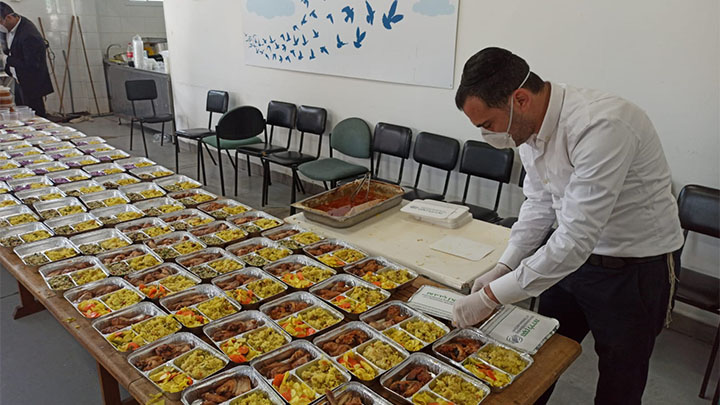Their Need For Food is Greater Than Ever “Before I began to get prepared meals from the soup kitchen, I was already used to not eating very much. I would live whole days on soup and a little bread, I didn’t even remember the taste of meat,” said Tova, an 83-year-old Holocaust survivor from Ashdod. Prior to the COVID-19 pandemic, Tova would come to the Fellowship-funded soup kitchen in Ashdod on a regular basis and eat together with other elderly and Holocaust survivors. When the pandemic changed their reality, Tova began to receive meals delivered to her house. Tova’s husband has passed away and she lives alone ever since. “I don’t have a pension and am living on my retirement benefits, which is hardly enough for medicines and a few groceries.” Tova made aliyah (immigration to Israel) with her husband and mother in 1982 and moved to Ashdod. “Before the Holocaust we were a very large family. My mother had eight brothers and sisters and my father also had a large family. They were all murdered, and it was a miracle that my mother was able to survive.” At the beginning of the war, her father was inducted into the Red Army and was killed in battle. Most of Tova’s extended family ran from the Nazis who were getting closer and closer to their home near Kishinev. The family escaped to Kazakhstan, where they lived in a room together with a number of other refugee families. “I remember that I was hungry all the time,” she said. “Those were very hard times.” Thanks to her mother’s bravery, Tova survived the Holocaust, grew up, married, and started a family with her husband. “I made aliyah together with my husband and my mother, and they both died about ten years after we arrived in Israel, in a span of a few months.” Tova has a 62-year old disabled son, and last year, they both started to receive cooked meals from the soup kitchen. Since the COVID-19 pandemic broke out in Israel, Tova does not leave her house. She spent Passover alone. But Tova’s caregiver comes for two hours each day, and she continues to receive cooked meals from the soup kitchen. Yoav Azran, manager of the Fellowship-funded soup kitchen, says that the request for meals and food packages has doubled since the pandemic began. “We are not allowed to open the restaurant, so either people come here to pick up the food or we bring it to them at home.” According to Azran, the number of elderly people who need food is rising drastically. Food is a basic existential need. Nutritional security is a right mentioned in the U.N. charter, which defines three conditions for food: availability, accessibility, and serviceability. A lack of nutritional security is one of the symptoms created by poverty, and poverty is one of The Fellowship’s core areas. The Fellowship provides respectful economic assistance to its beneficiaries that allows them a choice of how to make use of the assistance. At the same time, providing food services enables broader fundraising and connects The Fellowship’s donors with the organization. In Israel, there are 24,000 needy people who eat each day at about 150 soup kitchens throughout the country. Most of these people are elderly, some are disabled, some are single-parent families. Out of 192,000 impoverished elderly, 43% out of this number have reported that they have to do without healthy food. Soup kitchens work in various ways people eat at the soup kitchen, food is distributed to people who come to the soup kitchen but are not interested in sitting there, and meals are distributed to the homes of elderly who are not mobile. As a result of the COVID-19 crisis there is a significant increase in the numbers of elderly people needing help that are contacting the social services offices. This is why we are looking to the kind generosity of our supporters, to help out during this time. Please give as generously as you can. |
|
|


